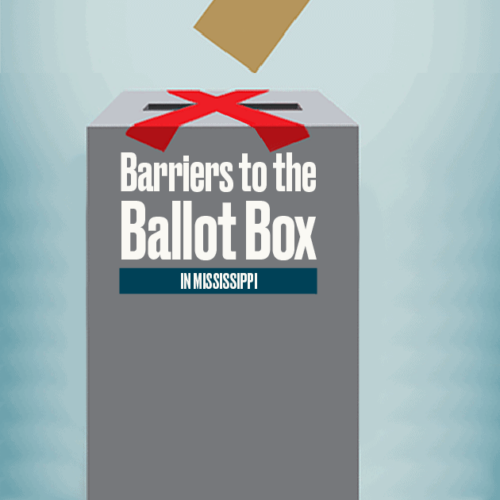Introduction
It’s unusually hard to vote by mail in Mississippi, and the state hasn’t done much to change that during the pandemic. When voting-access advocates sued this summer, officials battled in court to keep the restrictions — and they’ve largely succeeded.
“It’s a majority Republican legislature; we’ve got a Republican governor,” said Rob McDuff, director of impact litigation for the Mississippi Center for Justice, a nonprofit public-interest law firm that filed a lawsuit over the rules. “I think they don’t like the notion of mail-in voting. I think they believe it’s in their political interest to limit the possibilities of voting.”
Sign up for The Moment newsletter
Our CEO Susan Smith Richardson guides you through conversations and context on race and inequality.
Here’s a look at some of the most significant updates on restrictions to voting rights and access in the state:
Who can vote by mail?
The majority of states allow any registered voter to cast their ballot by mail, and of those that don’t, most broadly expanded eligibility to account for COVID-19. Mississippi didn’t follow suit.
Among its allowed excuses to receive a mail-in ballot: a permanent or temporary disability that makes voting in person a hardship or danger. As the coronavirus spread, the state legislature added to that category people in “a physician-imposed quarantine due to COVID-19” or caring for a dependent in quarantine.
The Mississippi Center for Justice sued, asking a judge to clarify that voters with health conditions that put them at a higher risk of COVID-19 complications can cast an absentee ballot. The state’s health officer recommended that such residents stay at home as much as possible, and urged everyone to avoid indoor gatherings of more than 20 people.
But the Mississippi Supreme Court ruled that a health condition that makes COVID-19 more dangerous is not enough. The condition must qualify as a disability.
A separate lawsuit filed in federal court by the Lawyers’ Committee for Civil Rights Under Law and the Southern Poverty Law Center also challenged the restriction. They’re awaiting a ruling.
“A lot of our arguments are based on the fact that this is too confusing,” said Caren Short, senior staff attorney at the law center. For instance, she thinks a doctor ordering you to stay home for your own safety could count as a quarantine.
“The state is essentially leaving this up to the discretion of county officials,” Short said, “and you’re going to get a different answer in every county.”
Voters who can’t cast an absentee ballot in Mississippi don’t have the option of early voting, either. They must show up on Election Day, risking crowds and infection.
It’s the only state that isn’t offering either early voting in person or by mail to all voters, the Democracy Initiative said.
How to vote by mail
A handful of states require that absentee voters get a witness — in some cases, an official such as a notary — to sign their ballot envelope. Mississippi is in the notary camp, a restrictive standard. And it’s the only state that also requires the signature of a notary or other qualified official on an application to get that absentee ballot, according to the National Conference of State Legislatures.
“Mississippi’s process is incredibly difficult,” Short said.
Some states have waived the witness rule during the pandemic. Mississippi did not. The legislature made a small nod to COVID-19 by clarifying that a voter in, or caring for someone in, a physician-imposed quarantine may rely on a non-notary witness, which state law already allows for people with disabilities.
The Southern Poverty Law Center’s lawsuit also challenges the requirement for a witness. And it targeted the state’s process of rejecting ballots over mismatching signatures without notifying voters or giving them an opportunity to fix the problem.
In October, the Mississippi secretary of state responded with a notice-and-cure process. Now, if elections officials think a voter’s signature on the ballot doesn’t match the signature on the application, they must give the voter a chance to correct it.
Felony disenfranchisement
In 1890, white leaders intent on blocking Black men from voting wrote a poll tax and literacy tests into Mississippi’s state constitution. It would take many decades before those tools of voter suppression were removed.
But the framers’ decision to strip the right to vote from people convicted of certain crimes — ones they believed would disproportionately disenfranchise Black men — is still in force.
The list of crimes, later expanded to include murder and rape, do not include all felonies. Nearly 16% of Black Mississippians were prevented from voting in 2016 by the ban, according to the Sentencing Project.
“We filed a challenge to that because of its racist origins, and we lost,” said McDuff, with the Mississippi Center for Justice.
The center has appealed.
Read more in Money and Democracy
US Polling Places
Louisiana expands who can vote by mail this year, but other barriers remain
The state is among the minority requiring a witness signature on ballots, even during the pandemic. But lawmakers did extend voting rights to thousands more people.
US Polling Places
In New Hampshire, obstacles to registering, confusion over absentee ballots
And despite court victory against college voting restrictions, it won’t be easy for students this November.


Join the conversation
Show Comments